|
|
|
Sort Order |
|
|
|
Items / Page
|
|
|
|
|
|
|
| Srl | Item |
| 1 |
ID:
167596
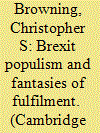

|
|
|
|
|
| Summary/Abstract |
For Leave voters the Brexit referendum of 23 June 2016 was invested with hopes and dreams, of refound sovereignty and control, freedom and liberty, subjectivity and agency. Brexit was an opportunity for both new beginnings and a reclamation of British essences. Winning, however, has not provided the closure promised, and today Leave supporters often appear decidedly anxious and angry. Bringing together literature on ontological security with Lacanian understandings of the (always incomplete) nature of subjectivity, this paper provides an explanation of how it is that ’Brexit’ became invested with such high hopes of fulfilment, but also why the populist ’fantasies’ underpinning Brexit have inevitably fallen short. However, while closure around ontological security and subjectivity is impossible, the paper shows how the promise of fulfilment (and its inevitable failure) can be politically seductive and mobilizing, is a central strategy of populist politics, but as such is also one that is only likely to exacerbate the ontological anxieties and insecurities upon which populist politics preys.
|
|
|
|
|
|
|
|
|
|
|
|
|
|
|
|
| 2 |
ID:
167600
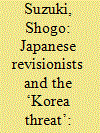

|
|
|
|
|
| Summary/Abstract |
This article contributes to the debate on Japanese security. Drawing on insights from ontological security, it challenges conventional understandings that China and North Korea are Japan’s main security threats. It argues that South Korea poses a powerful threat to the Japanese right-wing revisionists’ perception of Japan. The revisionists have attempted to secure Japan’s identity from the ‘Korea threat’ by labelling South Korea a ‘non-democracy’, and this tactic has been taken up by the Japanese government as well. The article concludes by pointing out that such moves could unwittingly result in the emergence of security dilemmas between the two main democracies in Northeast Asia.
|
|
|
|
|
|
|
|
|
|
|
|
|
|
|
|
| 3 |
ID:
167603
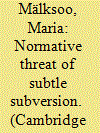

|
|
|
|
|
| Summary/Abstract |
A combination of undemocratic developments in Hungary and Poland as well as Eastern Europe’s reluctance to engage in solidary burden-sharing at the height of the refugee crisis in Europe has brought back familiar allusions of Eastern Europeans as troublemakers for European unity and peace. This article offers a discursive dissection of ‘Eastern Europe’ as a subtly subversive challenge to Europe’s security of ‘self’, entailing a fear of being overrun by an ‘other’ perceived as endangering one’s normative and cultural order. Proceeding from Ingrid Creppell’s (2011Creppell, Ingrid (2011) ‘The concept of normative threat’, International Theory, 3:3, 450–487
[Crossref], [Web of Science ®] , [Google Scholar]
) notion of normative threat, this article argues that the reappearance of ‘Eastern Europe’ as an ontological insecurity trope is indicative of deeper anxieties within Europe, some of which are systemic (such as doubts about the efficacy of integration and the legitimacy of the European Union) and some of which are contingent (such as concerns about defending the European political order from populist upsurges amidst ‘resurgent nationalism’).
|
|
|
|
|
|
|
|
|
|
|
|
|
|
|
|
| 4 |
ID:
167595
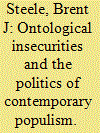

|
|
|
| 5 |
ID:
167597
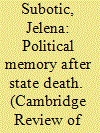

|
|
|
|
|
| Summary/Abstract |
This article explores the relationship between political memory, state ontological security, and populist movements after state death. When a state dies, ideological space opens up for new state agents to narrate a different version of the past, one that delegitimizes the ideological underpinning of the old state order and creates ontological insecurity in the new polity. Populism becomes an especially attractive ideology, as it feeds on a sense of insecurity at home and abroad. The argument is illustrated with the case study of transformed Holocaust remembrance after the death of Yugoslavia. Tracing the history of the Yugoslav memorial exhibition at Auschwitz, the article demonstrates ways in which post-Yugoslav Holocaust remembrance has focused on delegitimizing Yugoslavia’s communist past, especially its antifascism. Once antifascism is removed from state political memory, political space opens up for a revival and ideological normalization of populist—and at its most extreme—fascist ideological movements in the present.
|
|
|
|
|
|
|
|
|
|
|
|
|
|
|
|
| 6 |
ID:
167599
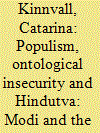

|
|
|
|
|
| Summary/Abstract |
In an era increasingly defined by insecurity and populist politics, India has emerged as a forceful ontological security provider under the leadership of Marendra Modi. If ontological security is about finding a safe (imagined) haven, then ontological insecurity is about the lack of such a space in narrative terms. Drawing on Lacanian understandings of ‘the imaginary’ as something that can fill and naturalize this lack of space, the article is concerned with how memories, places and symbols of narrative identity constructions are used in populist discourse. More specifically, it attempts to understand the relationship between ontological insecurity and the imaginaries of populist politics in India. In so doing, it argues that the re-invention of ‘nationhood’, ‘religion’ and ‘Hindu masculinity’ along gendered lines has created a foundation for governing practices aimed at ‘healing’ a number of ontological insecurities manifest in Indian society. It specifically looks at how the Modi doctrine has formulated and expanded its foreign policy discourse into one that privileges populist narratives of nativism, nationalism and religion as forms of ontological security provision at home and abroad, but also how everyday practices can challenge such narratives, thus allowing different imaginaries of the Indian state.
|
|
|
|
|
|
|
|
|
|
|
|
|
|
|
|
| 7 |
ID:
167602


|
|
|
|
|
| Summary/Abstract |
For most observers, the election of Donald Trump as the 45th president of the United States (US) came as a shock. This has been widely recast as the culmination of the American public’s long-standing dissatisfaction with the political elite and deep-seated frustrations with broader socio-economic conditions. We argue that the Trump campaign’s success also stemmed from its effective use of an emotionally charged, anti-establishment crisis narrative. With insights from political psychology, we examine the socio-linguistic mechanisms that underlie the effectiveness of ‘Trump-speak’ through both quantitative and qualitative content analysis of Trump’s communications toolkit during the 2016 US presidential election campaign. We show that his leadership legitimation claims rest significantly upon ‘crisis talk’ that puts his audience in a loss frame with nothing to lose and explain why ‘crisis talk’ impacts on political behaviour. As we demonstrate, the crisis stories that political agents tell simultaneously instil ontological insecurity among the American public and serve to transform their anxiety into confidence that the narrator’s policy agendas are the route back to ‘normality’. Through these rhetorical mechanisms, the Trump campaign manipulated individuals’ ontological (in)security as a tool in the politics of reassurance at the broader, societal level.
|
|
|
|
|
|
|
|
|
|
|
|
|
|
|
|
| 8 |
ID:
167598
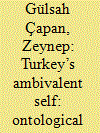

|
|
|
|
|
| Summary/Abstract |
This article aims to understand the ‘non-Western self’ and the different ways its ontological insecurity can manifest, through the example of Turkey, by contrasting Kemalism’s modernizing vision with Erdoğan’s current populism. We argue that the constructions of political narratives in Turkey (and by implication in other similar settings) derive from two interrelated aspects of the spatio-temporal hierarchies of (colonial) modernity: structural insecurity and temporal insecurity. Modern Turkey’s ontological insecurity was constructed spatially, on the one hand, as liminality and structural in-betweenness, and temporally, on the other, as lagging behind the modernization of the West. After discussing how Kemalism offered to deal with such insecurities in the twentieth century, we analyse the Justice and Development Party (AKP) period of the twenty-first century as an alternative attempted answer to these problems and explain why efforts to dismantle the Kemalist framework collapsed into its populist mirror image. The example of the Turkish case underlines the importance of focusing on the different ways in which the structural and temporal insecurities of ‘the non-Western self’ take shape at a given point and manner of entry into the modern international order.
|
|
|
|
|
|
|
|
|
|
|
|
|
|
|
|
| 9 |
ID:
167601
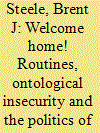

|
|
|
|
|
| Summary/Abstract |
This article investigates the military ‘reunion’ videos that proliferated in the United States throughout the late 2000s and early 2010s. The typical video entails a returning soldier who surprises a family member, usually a child or female spouse, at a public event. I articulate the reunion video as a key feature of populism in contemporary US society. The videos can be considered examples of the ‘encounters’ theorized by both Anthony Giddens and Erving Goffman. Both private and public ‘social occasions’ with performative qualities of ‘day-to-day life’, the videos disclose the institutional and societal routines of not only a family but broader layers and circles of the US political community. They relate not only to loss but also to redemption. The article therefore investigates when and how, and provides a provisional argument for why, these videos have proliferated by consulting the everyday features of ontological security. It focuses on both the local and the international contexts within which they attend to, but also generate, US ontological insecurity.
|
|
|
|
|
|
|
|
|
|
|
|
|
|
|
|
|
|
|
|
|